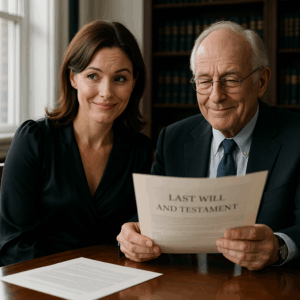I can vividly recall her face – that self-satisfied, practiced grin. Her meticulously manicured nails lightly drumming on the polished oak surface, as though she was already envisioning the fortune soon to be hers.
She never glanced my way once the lawyer began unveiling the will’s contents. It was unnecessary for her to do so; she was convinced she had already secured victory.
Several months before, when Dad married Vanessa, I hoped she truly cared for him. Young and beautiful, Vanessa possessed a lively spirit and laughed at his jokes with ease. Dad was a brilliant man, yet loneliness enveloped him after Mom’s passing.
Perhaps, I thought, she could heal him. Vanessa called me “kiddo,” gifted me a watch to celebrate my graduation, and even endured cooking lasagna on Sundays despite her dislike for it. I welcomed her into our lives.
Regrettably, that trust was misplaced. What began subtly quickly escalated. Invitations to family dinners stopped arriving; locks on doors changed while I was away at work.
Dad started echoing Vanessa’s remarks—little digs implying I was still uncertain about my direction in life. One evening, I overheard a phone conversation she held openly.
“Once he’s gone, it’s all mine. The kid won’t get a penny. That’s how we planned it.”
I stood frozen in the hallway, clutching the wall so tightly my fingers hurt. She was fully aware I was listening.
Finishing the call, she stared directly at me and sneered, “Don’t look so surprised, kiddo. This is how the world really works.”
I said nothing. No argument. No outburst. Just a composed smile.
And so, the strategy unfolded. Vanessa believed Dad’s will was final; what she didn’t realize was how deeply Dad trusted me. For months before his health worsened, I assisted him in revising his estate plans.
When the doctor delivered the terminal diagnosis, Dad calmly confided in me, assuring, “You’ll be fine.” His longtime attorney, Robert, helped us reshape the will—carefully designed not to exclude Vanessa completely.
The aim was clear: prevent Vanessa from accessing the majority of Dad’s assets without my approval. Hidden within the legal jargon was a pivotal clause. At first glance, it meant nothing to Vanessa, but soon it would mean everything.
When Dad passed away, Vanessa did not grieve openly. Clad in black, she maintained a serene smile throughout the funeral.
By the third day, she was already consulting with real estate agents about selling his properties. She even confronted me alone in the kitchen.
“Don’t bother attending the will reading. You won’t inherit a thing.”
Calmly, I replied, “I will be there.”
Her laughter echoed like I had just shared the world’s greatest joke.
The room smelled of leather and old parchment as Robert took his seat at the table’s head. Vanessa, dressed in sleek black silk, sat to his right, poised as a queen awaiting her coronation.
At first, the chain of bequests to charities and gifts to loyal employees followed an expected pattern.
Then, my name was announced. Vanessa’s grin twitched nervously.
“To my son, I leave the full controlling interest in the Winston Holdings Trust, encompassing all related accounts, assets, and properties—save for,” he paused, adjusting his spectacles, “the residence at 4 Park Lane and an annual stipend of $100,000, which I allocate to my wife Vanessa.”
Startled, she turned sharply toward Robert, snapping, “That’s all?”
Robert smiled faintly.
“According to paragraph 14, any sale, lease, or transfer of trust assets mandates your stepson’s exclusive consent. Without his written approval, no liquidation or encumbrance of the trust’s properties may occur.”
Speechless, Vanessa gazed at me, her eyes razor-sharp. “You planned this,” she accused.
“No, Vanessa,” I answered, serene. “Dad did—I only ensured the arrangement was flawless.”
She hoped to dismiss it, claiming indifference.
- Her credit cards declined, revealing restricted access to joint accounts tied to the trust.
- Real estate brokers ceased contact once they realized she controlled no sellable assets.
- She was granted residency in the house, nurturing a false sense of security.
- Attempting to lease the guest wing without my consent, she unknowingly triggered the key clause.
Ultimately, I sold the property within legal limits, all without her consent. Vanessa received her stipulated $100,000 annually—sufficient to subsist, but far from affording the lifestyle she assumed was hers.
The last time our paths crossed, she stood outside the gates of Park Lane, suitcase at her feet, avoiding my gaze as I passed.
I paused a moment, quietly saying, “Guess you were mistaken, kiddo.” Her jaw tightened, but I walked away without looking back.
Revenge requires more than anger; it demands patience. It’s about discerning when to remain silent and wait for the foundation beneath your adversary to crumble.
Dad used to say, “A sharp mind cuts deeper than a sharp blade.” He was undoubtedly right.
In summary, this story revolves around trust, betrayal, and strategic planning. Though initially deceived by Vanessa’s façade, careful preparation safeguarded the rightful inheritance, demonstrating wisdom over impulsiveness. The outcome reveals the power of foresight and resilience in overcoming adversity.
